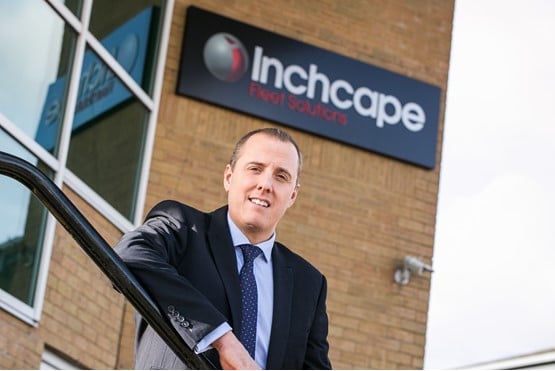Multiple channels, multiple products and services and a diverse customer base evens out IFS’s risk. That’s how MD Matt Rumble likes it.
Balance. It’s a word Matt Rumble (below) continually refers back to during our 90-minute interview.
A balanced portfolio of customers, of products and services, of risk and of new initiatives – Rumble chooses his words carefully as he seeks to position Inchcape Fleet Solutions as the fleet management and funding company of choice for fleets of all types and sizes.
Note the equal weighting he gives to fleet management and funding. Note also the use of the word funding, not contract hire and leasing. Both are significant.
Inchcape Fleet Solutions (IFS) was established in 2001 with the merger of two Inchcape Group businesses two years earlier: Kenning Leaseline, a fleet management company, and Mann Egerton Vehicle Contracts, the fleet funding operation.
This merger of equals explains why IFS has such a large number of fleet-managed vehicles in addition to its funded fleet. Of the 52,000 or so vehicles on its books (two-thirds cars, one-third commercial vehicles up to five tonnes), fewer than half (around 20,000) are funded.
The management-to-funding ratio has remained fairly even over the years, as has the overall number of vehicles.

There have, of course, been business wins and losses; for all leasing and fleet management companies, the tender procedure has become ever more challenging as procurement departments become more involved in fleet decisions.
However, IFS can point to plenty of long-term customers, some dating back to its formation.
“There is certainly more rigor applied to the process,” says Rumble. “Companies want a trusted partner, someone to come in and consult who can offer a balanced portfolio of products and services.
"They are looking for best value but they understand that in order for us to give them what they want, they have to come into partnership with us. We have to do it together.”
In return, IFS promotes an “open and transparent” relationship, sharing information on how it operates and how the contract can be serviced in the best way.
“We know what we are and we know how the partnership will work the best,” Rumble says.
Since Inchcape merged the two operations 19 years ago, IFS has, in typical company fashion, kept a low media profile – indeed, Fleet News has been seeking interviews with all of Rumble’s predecessors over the past decade with no success.
So, what’s changed now? Nothing, according to Rumble; he simply recognises the benefits that come from attaining a higher profile in the fleet sector, particularly during a time of considerable change for operators of company cars and vans.
Rumble was appointed managing director of Inchcape Fleet Solutions in January. It’s a newly-created job title – previous incumbents were fleet services directors – which puts the organisational structure on a par with FN50 rivals.
The business strategy is to grow in a “sensible, organic” way, although questions about targets are politely batted away.
IFS’s focus will be on maintaining a “balanced portfolio” of customers, from public sector, blue-chip, mid-to-large corporates, SMEs, not-for-profit organisations and personal leasing.
“Having multiple channels with multiple products and services and a diverse customer base balances our risk; it makes for a solid business,” Rumble explains.
“It’s about having multiple blended solutions for cars and commercial vehicles, something for the cash-for-car driver, the high business mileage driver, employee car ownership (ECO), contract hire, contract purchase, outright purchase – we have many customers who take multiple solutions from us.”
Typically, customers opt for three or four funding solutions, such as a mix of contract hire, outright purchase, cash-for-car/PCH and salary sacrifice. More recently, discussions have included ECO schemes and total mobility packages.
“Setting our stall out as a fleet management company helps with these funding solutions,” Rumble adds.
A fundamental part of his plan is having tailored solutions that customers require. New product development through innovation is key.
But, IFS steers away from pursuing the personal agenda for individual fleet customers; it is looking for common ground solutions that can be rolled out to multiple fleets rather than bespoke answers applicable to just one.
“We listen to our customers and take their feedback seriously,” Rumble says.
“We see if we are getting similar feedback from other customers and, if we are, then we will bring those customers with us during the development to make sure it works for them.
"We’ll make changes along the way and then launch something that is relevant to a broad customer base.”
Key to the planning process is the annual Fleet Exchange day where IFS gathers its 70 customers and a number of prospects to discuss the important issues.
The latest meeting, which took place in September, focused on three topics: connected vehicles and data, blended fleet solutions and the environment.
“Out of that comes certain outputs and we will focus on those with our customers to ensure our products and services are aligned now and for the next four or five years, especially around the total mobility concept and how that fits into their journey,” Rumble says.
“We also hold industry forums every three months with smaller groups to design and map out the future. This is our innovation team’s top priority.”
Rumble created the innovation team earlier this year. It consists of three people headed by marketing and innovation manager Lauren Evans.
One of its projects will be to look at mobility solutions, focusing on the journey rather than the transportation.
Demand for such services is coming from employees who want greater choice in the face of a range of pressures, including environmental, cost, taxation and legislation, as well as the need for convenience.
“Mapping the journey, not the asset, will open up more options. We understand the path but we are on the journey, in a controlled way, with our customer base,” Rumble says.
“The innovation team will come up with new products and services, but it will be data- and technology-led.”
Three years ago, IFS launched a new fleet management service to counter the rising influence of brokers and consultants.
Autobid is a competitive tendering solution which compares prices from a panel of five leasing companies - Alphabet (GB), Arval, Grosvenor, SG Fleet and Volkswagen Financial Services – and is being used regularly by “a substantial number” of fleets. The actual number is confidential.
Autobid also plays a key role in IFS’s salary sacrifice product Justdrive, integrating the competitive tendering functionality to enable employees to receive real-time quotes from the leasing panel.
Like some rivals, Inchcape believes its customers’ staff open up new opportunities for business, particularly if they opt to take cash due to the uncertainty over future BIK (post-OpRA, it’s seen a mixed response: some are opting for cash while other companies have shut their cash schemes).
The company branched out into personal contract hire earlier this year with the launch of LeaseMyCar and is “very happy” with the activity levels so far.
“We are targeting employees of existing customers, whether or not they have taken cash,” Rumble says.
“It complements what we already do – it’s giving the customer choice.”
However, he believes many will continue to choose a company car, despite the perceived clamour for alternative mobility solutions, while vans will remain a mainstay of fleet operations.
“People will still be using vans and cars and all of our services. It may be more of a blended package, but there is still a place for both,” he says.
“We are a fleet management company with multiple products that is there to serve the many, but with tailored solutions. As blended fleets increase in popularity, we are well-placed to benefit by serving the needs of all our clients.”





















Login to comment
Comments
No comments have been made yet.